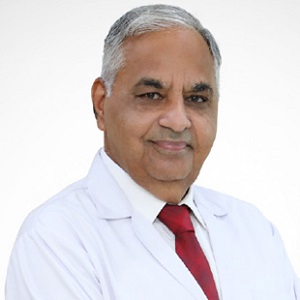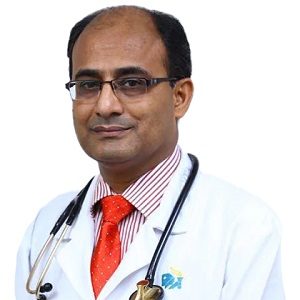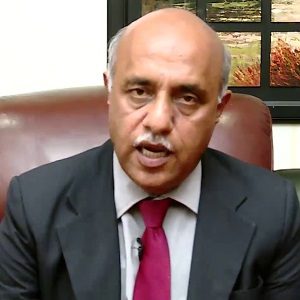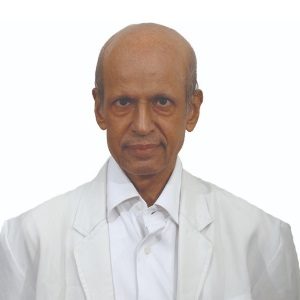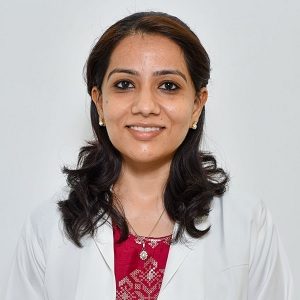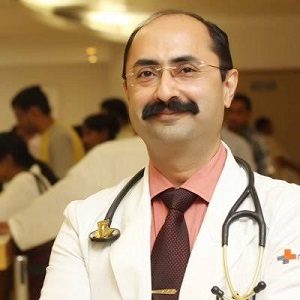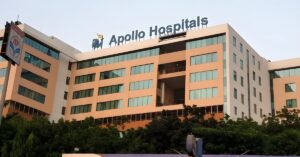Best Doctors in India for Pheochromocytoma Treatment
- Top Endocrinologist & Diabetologist | BLK Hospital, New Delhi, India
- 49+ Years Experience
- BLK Super Specialty Hospital, New Delhi
Profile Highlights:
- Dr. Ashok Kumar Jhingan stands as a towering figure in the realm of Endocrinology, renowned for his unwavering commitment to combating the diabetes epidemic in India.
- Dr. Jhingan serves as the Senior Director at the Centre for Diabetes, Thyroid, Obesity & Endocrinology at BLK-Max Super Speciality Hospital, New Delhi.
- Dr. Jhingan’s influence extends beyond clinical practice. He has been nominated as a Government Nominee for two terms at the Morarji Desai Institute for Yoga & Naturopathy, reflecting his dedication to integrating holistic approaches into diabetes management.
- Endocrinologist and Diabetologist, Chennai, India
- Over 36 years’ experience
- Apollo Hospitals Greams Road, Apollo Spectra Hospital Chennai-Alwarpet
Profile Highlights:
- Dr. P G Sundararaman is one of the senior Endocrinologists in Tamil Nadu with an experience of 36 years in this field.
- Patients seek consultation for bioidentical hormone therapies for men and women, Thyroid Disorder Treatment, Gestational Diabetes Management, Growth Abnormalities, Endocrine Stem Cell Therapy, Lactation Counselling, etc.
- He keeps himself updated with the latest in the field by attending national and international conferences.
- Endocrinologist and Diabetologist, Chennai, India
- Over 26 years’ experience
- Apollo Hospitals Greams Road, Apollo Sugar Clinics Greams Road
Profile Highlights:
- Dr. Boochandran is one of the best Endocrinologists in Chennai, with 26 years of experience in diabetes and endocrinology.
- After completing his MBBS in Chennai, he went on to earn his Master’s degree from Kings College Hospital in London.
- Dr. Boochandran specializes in the treatment of hypothyroidism, obesity, parathyroid dysfunction, polycystic ovarian disease, and a variety of other endocrine gland disorders.
- Endocrinologist and Diabetologist, Chennai, India
- Over 38 years’ experience
- Apollo Hospitals Greams Road, Apollo Sugar Clinics Greams Road
Profile Highlights:
- Dr. Shantharam D is a renowned Endocrinologist & General Physician in Tamil Nadu, having 38 years of experience.
- The doctor has received many awards for teaching and service in the field. Dr. Shantharam keeps himself updated by attending workshops and conferences organized internationally or nationally.
- He is a faculty member for the PHFI’s certificate course in Evidence-Based Diabetes Management and the TN Government’s certificate course in Diabetes for practicing physicians, particularly those from rural Tamil Nadu.
- Endocrine Surgeon, Chennai, India
- 22 + years’ experience
- Apollo Hospitals Greams Road
Profile Highlights:
- With a distinguished career spanning over 22 years, Dr. Sai Krishna Vittal stands as a leading figure in endocrine surgery, currently affiliated with Apollo Hospitals Greams Road in Chennai.
- His extensive qualifications, including MBBS, MS, DNB, FRCS(Ed), FRCS(Eng), FICS, FAES, and FCSSL (Hon), reflect his commitment to excellence in the field.
- He is adept at managing complex disorders related to various hormonal glands such as the thyroid, parathyroid, adrenal, and other neuroendocrine glands.
- Endocrinologist and Diabetologist, Chennai, India
- Over 33 years’ experience
- Apollo Hospitals Greams Road
Profile Highlights:
- Dr. Sivagnana Sundaram, a renowned endocrinologist in Chennai, specializes in diabetes treatment for patients.
- With 33 years of experience, he is India’s first DNB-qualified endocrinologist.
- Dr. Sundaram offers Lactation Counselling, Goiter Treatment, Hyper and Hypo Thyroid Treatment, Diabetes Management, and Gestational Diabetes Management to name a few.
- Endocrinologist and Diabetologist, Chennai, India
- Over 16 years’ experience
- Apollo Hospitals Greams Road, Apollo Sugar Clinics Greams Road
Profile Highlights:
- Dr. Narayanan N K is a well-respected endocrinologist in Chennai, having practiced for more than 16 years.
- Dr. Narayanan received the best abstract prize for his research on non-invasive lateralization tactics in the treatment of primary hyperaldosteronism. His poster presentation on Familial adrenocortical carcinoma has awarded as the best at the BES conference.
- Several of Dr. Narayanan’s research works have appeared in peer-reviewed journals published domestically and abroad.
- Endocrinology, Paediatric, Paediatric & Adolescent Endocrinology, Gurugram, New Delhi, India
- 15 + years’ experience
- Artemis Hospital, Gurgaon
Profile Highlights:
- Dr. Sumeet Arora is a distinguished Senior Consultant specializing in Pediatric and Adolescent Endocrinology at Artemis Hospitals, Gurugram.
- With an exceptional educational and clinical background, Dr. Arora is American Board Certified in both Pediatric Endocrinology and Pediatrics, reflecting her dual expertise in managing complex endocrine disorders in children and adolescents.
- Her impressive credentials include an MBBS from Kasturba Medical College, Manipal University, and an MD in Pediatrics from the University of Tennessee College of Medicine, Chattanooga.
- Endocrinologist and Diabetologist, Gurugram, India
- Over 20 years’ experience
- Medanta-The Medicity, Gurgaon
Profile Highlights:
- Dr. Jasjeet Singh Wasir has been the Director and Consultant at the Department of Endocrinology and Diabetology in Medanta-The Medicity Hospital in Gurugram.
- Under the umbrella and guidance of Dr. Ambrish Mithal, he has been an expert doctor treating patients suffering from PCOD, obesity, and thyroid disorders.
Best Hospitals in India for Pheochromocytoma Treatment
- City: New Delhi, India
Hospital Highlights:
- Equipped with 650 beds, BLK-Max Super Speciality Hospital is the largest stand-alone private sector hospital in Delhi.
- With over 1500 healthcare providers and 150 globally renowned super specialists, the hospital is one of Asia’s largest BMT Centres. The hospital is known for having some of the best cancer doctors in the country.
- The hospital is NABH and NABL accredited and was inaugurated by the first Prime Minister of India. Pt. Jawahar Lal Nehru.
- City: Hyderabad, India
Hospital Highlights:
- Located in the vibrant city of Hyderabad, Apollo Health City is a world-renowned medical facility that provides outstanding care and treatment to patients coming from different parts of the world.
- Founded in 1988, this 550-bed multispecialty hospital with 50 specialties and 12 Centres of Excellence continues to deliver outstanding outcomes for patients with the simplest to the most complicated medical conditions.
- Backed by the latest medical equipment and a dedicated team of professionals, the hospital provides comprehensive treatment across various specialties including, cardiology, critical care, neurosciences, cancer, orthopedics, gynecology, ENT, transplants, gastroenterology, etc.
- Apollo Health City is a cutting-edge healthcare facility that combines various facilities under one roof. These may include state-of-the-art physical medicine, rehabilitation, and wellness services with education, research, telemedicine, innovative medical devices, disease management programmes, and medical talents.
- The hospital is known for offering top-notch cancer treatment accompanied by cutting-edge facilities and technology.
- The hospital also offers a broad spectrum of cosmetic procedures that improve not just appearance but also comfort.
- In 2011, Apollo Health City was the recipient of the Asian Hospital Management Award (AHMA).
- In 2013, the Government of India recognized Apollo Health City as the top medical tourism destination in the country.
- City: Mumbai, India
Hospital Highlights:
- Kokilaben Dhirubhai Ambani Hospital, Named after the wife of Indian industrialist Dhirubhai Ambani, the founder of Reliance Industries, this is one of the top hospitals in Mumbai. This 750-bed multi-specialty hospital became operational in 2009. Known as one of India’s most advanced tertiary care facilities, the hospital is designed to raise India’s global standing as a healthcare hub, with an emphasis on excellence in clinical services.
- Kokilaben Dhirubhai Ambani Hospital uses Protocol and Care Pathway based treatment models to ensure the best outcomes for patients.
- The hospital represents a confluence of top-notch talent, cutting-edge technology, state-of-the-art infrastructure, and, most importantly commitment.
- The hospital also holds the accreditation of the NABH, NABL, CAP, and JCI.
- The hospital has been recognized as the No. 1 Multispecialty Hospital in Mumbai and the West Zone for the fifth year in a row in 2020 by The Week.
- City: Chennai, India
Hospital Highlights:
- Apollo Cancer Centre in Teynampet, Chennai is one of the best super speciality hospitals in India. It is the country’s first ISO-certified healthcare facility.
- Additionally, it is the first hospital in Chennai and the first oncology hospital in India to receive NABH accreditation.
- The hospital provides advanced tertiary care in oncology, orthopedics, neurology and neurosurgery, head and neck surgery, and reconstructive and plastic surgery.
- Additionally, it offers specialized healthcare of international standards with results comparable to those of the best hospitals in the world.
- It is outfitted with 300 beds, the newest and greatest technology, a large pool of highly qualified specialists, and a committed team of medical and paramedical professionals.
- It is one of the first few medical facilities in India to offer comprehensive cancer care. A team of skilled medical, surgical, and radiation oncologists makes up the Tumour Board, which is a component of the complete treatment planning system. After reviewing reported cases, the Board determines in concert with diagnostic specialists what course of action is best for each individual patient. The panel is further supported by dieticians, medical counselors, speech therapists, and other pertinent specialists.
- The hospital launched the first ExcelsiusGPS® Spine Robot in South India and has completed over 50 surgeries till date.
- It is also one of the few cancer hospitals in India to offer Cyber Knife therapy. Till now it has completed 1320 Cyber Knife therapies.
- The institution is also one of the few in India with the capacity to do transplants and find a prospective unrelated donor. The hospital has performed over 1000 BMTs till now.
- Furthermore, it has an exceptional milestone of performing exultant Micro vascular free tissue transfer and Aesthetic surgeries on more than 1000 patients with success.
- City: Chennai, India
Hospital Highlights:
- Apollo Hospitals, Chennai, is one of the best hospitals for heart care in India. Over the years, Apollo has expanded all over India, as a healthcare chain.
- India’s first ‘Only Pancreas’ transplant was performed in Apollo Hospital. The hospital is known for successfully performing Asia’s first en-bloc combined heart and liver transplant, and over the years, it has attained a remarkable achievement in the global healthcare space. Around 3-4 organ transplants are performed in the hospital per day.
- Equipped with over 500 beds, this hospital in Chennai was established in 1983 and since then has been among the most preferred hospital for patients from all over the world.
- The hospital holds accreditation of the NABH and JCI and is the first hospital in India to be ISO 9001 and ISO 14001 certified. It is also the first South Indian Hospital to receive subsequent reaccreditation from the JCI USA 4 times.
- City: Chennai, India
Hospital Highlights:
- Established in 1999, Gleneagles Global Hospital, Chennai, is one of the top healthcare facilities in Southern India. It is part of the Gleneagles Hospital Chain, which is the fourth largest healthcare chain in the country. The hospital specializes in multi-organ transplants of kidneys, liver, lungs, heart, etc.
- The hospital has an excellent infrastructure and state-of-the-art lab and equipment set-up. The hospital boasts cutting-edge technologies, a highly skilled team of doctors and surgeons, and trained support staff. Located in Perumbakam, Chennai, it is one of India’s premier health care destinations. The hospital has performed some of the most complex surgical and clinical procedures in India including multi-organ transplantations.
- The hospital’s lung transplantation program is one of the best in the country. The hospital is known for having performed India’s first single lung transplant and first minimal invasive lung transplant. It is also the only Indian hospital to be associated with King’s College Hospital, London, United Kingdom for liver transplantations.
- City: Hyderabad, India
Hospital Highlights:
- KIMS Hospital (a brand name of Krishna Institute of Medical Sciences) is one of the largest and best multi-speciality hospitals in Hyderabad. The hospital provides various treatments to an enormous number of patients.
- The hospital has a capacity of more than 3000 beds. KIMS Hospitals offers different healthcare services in more than 25 specialities and super specialities.
- The hospital is equipped with modern medical equipment and technology. It has robotic equipment to provide minimal invasive techniques for patients.
- The hospital is aimed at providing world-class healthcare facilities and services at an affordable cost for patients.
- The various specialities and departments of the hospital include neurosciences, gastroenterology & hepatology, robotic science, reproductive sciences, dental science, oncological sciences, organ transplantation, heart and lung transplantation and mother and child care.
- City: Kolkata, India
Hospital Highlights:
- Established in 2003, Apollo Gleneagles Hospitals is a 750-bed multispecialty tertiary care hospital situated in Kolkata.
- With 33 Centres of Excellence and more than 50 specialties, Apollo Gleneagles Hospitals, Kolkata is capable of handling all sorts of patients.
- This tertiary care hospital, which is a 100% subsidiary of Apollo Hospitals Enterprise Ltd., India, is regarded as one of Kolkata’s top hospitals.
- The facility is a complete blend of cutting-edge technology, state-of-the-art infrastructure, and genuine hospitality.
- Focusing on numerous specialties, the hospital provides all-inclusive medical treatments supported by cutting-edge technology and a staff of highly qualified medical specialists.
- Patients across the globe come to Apollo Gleneagles Hospitals Kolkata for their treatment. Moreover, international patients receive full attention and assistance for their treatment and are provided with a hassle free experience.
- Apollo Gleneagles Hospitals, Kolkata is the only hospital in Eastern India to hold the Joint Commission International (JCI) certificate.
- It is also the only hospital in Kolkata to hold the NABL accreditation in six different categories, which includes Clinical Biochemistry, Clinical Pathology, Hematology & Immunohematology, Microbiology & Serology, and Histopathology & Cytopathology.
- Furthermore, Apollo Gleneagles Hospitals, Kolkata is known for performing the first ever Reverse Shoulder Prosthesis Replacement in East India.
- City: Bengaluru, India
Hospital Highlights:
- Established in 1991, Manipal Hospital, Old Airport Road, Bangalore is the flagship facility of the Manipal Hospitals Group, which is one of the largest networks of Multispecialty Private Hospitals in India.
- The facility is well-known for its state-of-the-art technology, performance-driven, patient-centric, and evidence-based approach.
- The facilities offered at Manipal Hospital meet the highest international standards, allowing the hospital to attract a large number of national and international patients.
- Their expertise encompasses the diagnosis and treatment of a wide range of diseases in several specializations that address both simple as well as complex medical procedures.
- There are total 600 beds accessible in the hospital for the in-patients so they may heal while being closely watched after by the medical team. In addition, it has 144 critical care units, including NICUs, ICCUs, and ICUs. Apart from that, the hospital also offers 20 contemporary, modular state-of-the-art operating rooms with all the amenities needed.
- The hospital has several departments that are overseen by highly skilled, certified, and experienced medical experts.
- One of the best departments in the hospital is that of the Cancer department which is known for its advanced cancer diagnosis and treatment facilities such as Intracavitary Chemotherapy, Biological Therapy, HIPEC, PIPEC, Nuclear Medicine, Radiation Therapy, etc.
- It is one of the few hospitals in Bangalore that provides full range of pediatric services, including pediatric emergency services, pediatric gastroenterology, pediatric neurology, pediatric cardiology, pediatric orthopaedics, pediatric allergies, pediatric immunology, and infectious diseases.
- Furthermore, Manipal Hospital, Old Airport Road, Bangalore is also regarded as one of the best hospitals for bone and spine related disorders.
- City: Mumbai, India
Hospital Highlights:
- Established in 2016, Apollo Hospitals, Navi Mumbai is one of Maharashtra’s most advanced multispecialty hospital. This 500-bed hospital provides sophisticated treatments and integrated super specialty services under one roof.
- The hospital features a cutting-edge infrastructure that houses 13 state-of-the-art operating rooms, advanced laboratory and medical diagnostics, and 120 ultra-modern I.C.U. beds, including N.I.C.U. and P.I.C.U., monitored round the clock by critical care specialists.
- With 57 specialties and subspecialties, the hospital boasts a team of renowned medical specialists who offer accurate diagnosis and treatment with easy accessibility to their patients.
- Additionally, the hospital offers highly customized, individualized health check programs that are made to fit each person’s needs in terms of lifestyle.
- Apollo Hospitals, Navi Mumbai has been accredited by both the National Accreditation Board for Hospitals and Healthcare Providers (NABH) and the Joint Commission International (JCI).
- Apollo Hospitals Navi Mumbai has been awarded the “Best Practices-International Services Award” at the annual awards for service excellence and operations excellence.
Pheochromocytoma
Pheochromocytoma is a rare type of tumor that usually grows in the adrenal glands, above the kidneys. It is also known as an adrenal paraganglioma or a chromaffin cell tumor. It is generally common in adults between the ages of 30 to 50, though people of all ages might have it. Ten percent of all cases are known to occur among children.
Your adrenal glands produce hormones for controlling things like your metabolism and your blood pressure. A pheochromocytoma releases hormones as well, at much higher levels than normal. These extra hormones can lead to high blood pressure, and this might lead to damage to several of your organs, such as your brain, heart, lungs, and kidneys.
Though most pheochromocytoma tumors are benign, around 10 to 15 percent of them are generally cancerous, and they might spread to other parts of the body.
Symptoms
People having these tumors suffer from high blood pressure all the time. For others, it can go up and down.
Most people also have at least one or more of the following symptoms:
- Constipation
- Dizziness while standing
- Pale skin
- Fast or uneven heartbeat
- Severe headache
- Nausea
- Tremors
- Shortness of breath
- Unusual sweating
- Stomach, side, or back pain
- Vomiting
- Weakness
- Anxiety attacks
- Unintended weight loss
These symptoms can occur suddenly, like an attack, multiple times during a day. For some people, they might occur only a few times a month. As the tumor grows, the attacks can get stronger and might occur more often.
In some people, the attacks might be triggered by certain things such as:
- Pressure on the tumor
- Massage
- Certain medications
- Physical activity
- Childbirth
- Surgery
- Too much emotional stress
- Foods containing excessive amino acid tyramine, such as red wine, chocolate, or cheese
Causes & risk factors
Researchers are still unsure of what exactly is the cause of pheochromocytoma. This tumor develops in specialized cells, which are termed chromaffin cells, located in the center of an adrenal gland.
These cells release certain hormones, primarily adrenaline, and noradrenaline that helps to control several body functions, such as heart rate, blood pressure as well as blood sugar.
Adrenaline and noradrenaline trigger your body’s fight-or-flight response when a threat is perceived. The hormones can cause your blood pressure to increase as well as your heart to beat faster. They also prepare other body systems in order to help enable you to react quicker. A pheochromocytoma causes more of these hormones to be released even when you’re not in a threatening situation.
People having certain rare inherited disorders are at an increased risk of pheochromocytoma or paraganglioma. It is also likely that tumors associated with these disorders will be cancerous.
These genetic conditions include the following:
Multiple endocrine neoplasias, type 2 (MEN 2) – This disorder results in tumors in more than a single part of the body’s hormone-producing (endocrine) system. Other tumors which are associated with this condition may appear on the thyroid, tongue, parathyroid, lips, as well as the gastrointestinal tract.
Neurofibromatosis 1 (NF1) – This can result in multiple tumors in the skin, pigmented skin spots as well as tumors of the optic nerve.
Von Hippel-Lindau disease – This disorder can result in tumors at multiple sites, which can include the central nervous system, endocrine system, pancreas as well as kidneys.
Hereditary paraganglioma syndromes – These are inherited disorders which may result in paragangliomas or pheochromocytomas.
Diagnosis
Your doctor might require multiple tests for diagnosing this condition. These can include the following:
- PET imaging
- MRI
- Blood plasma test for catecholamine and metanephrine levels
- Laboratory tests in order to assess the hormone levels
- Urine metanephrines test for catecholamine and metanephrine levels
Treatment
Generally, the primary treatment for pheochromocytoma is surgery for removing the tumor. However, before you go for surgery, your doctor should likely recommend certain blood pressure medications. These are meant to block the actions of the high-adrenaline hormones and to lower the risk of developing extreme high blood pressure.
You will likely receive few drugs which can include alpha-blockers, for improving blood flow and decreasing blood pressure and beta-blockers, to make your heart beat slowly with less force.
It is also likely that your healthcare team will instruct you to consume a high-salt diet. These medications can cause a huge drop in your blood pressure; a high-salt diet will help you draw more fluid inside the blood vessels, and prevent you from having low blood pressure during and after the surgery.
Surgery
During the surgery, in most cases, the surgeon removes the entire adrenal gland with a pheochromocytoma using minimally invasive surgery. For this, your surgeon will need to create a few tiny openings through which he/she will insert wandlike devices equipped with video cameras and small tools.
The remaining healthy adrenal gland is able to carry out the functions normally performed by two. Blood pressure will likely return to normal within a short time.
If the other adrenal gland has been removed, then during the surgery, your doctor will remove only the tumor, and spare some of the healthy tissue.
If a tumor is cancerous, the tumor and other cancerous tissues are going to be removed. However, even if all of the cancerous tissues are not removed, surgery might limit the production of hormones. It also helps in providing some control over the blood pressure.
Cancerous pheochromocytoma treatments
Certains pheochromocytomas are also cancerous. And therefore, other treatments can be required for them, such as:
MIBG
This is a special kind of radiation therapy. It combines MIBG, a compound that attaches to the adrenal tumors, with a type of radioactive iodine. The goal of the treatment is to deliver radiation therapy to a specific site and eliminate the cancerous cells.
Chemotherapy
Chemotherapy involves using powerful drugs for killing fast-growing cancer cells.
Radiation therapy
This treatment might be used for symptomatic treatment of tumors that have spread to other parts of the body and causing pain.
Targeted cancer therapies
Peptide receptor radionuclide therapy (PRRT)
PRRT combines a drug that targets cancer cells with a small amount of a radioactive substance. It allows radiation to be delivered to the cancer cells directly.
People having pheochromocytoma which is not cancerous generally have a 5-year survival rate of 96 percent, while for people with a cancerous tumor, the survival rate is 44 percent.
For ensuring successful treatment, an early diagnosis is not always enough. It is best that you seek out a surgeon who is highly skilled and experienced.
Complications
High blood pressure caused by the tumors can cause damage to various organs, especially tissues of the cardiovascular system, brain, or even the kidneys. Some of the critical conditions include the following:
- Heart disease
- Kidney failure
- Problems with the nerves of the eye
- Stroke

